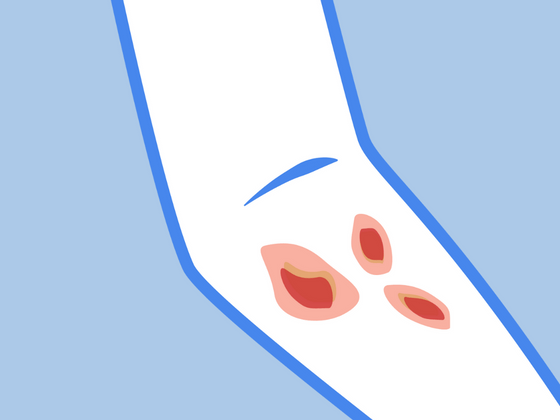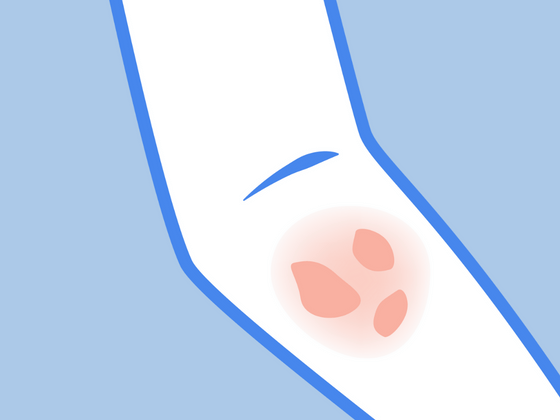Many people who experience eczema also develop asthma. This begs the question: are eczema and asthma somehow related, and if so, what does this mean for sufferers?
In this post, we’ll explore the correlation between eczema and asthma - including the shared genetic and environmental risk factors, defects of the skin barrier, and an overactive immune system.
Please keep in mind that although these what we discuss in this post can relieve eczema, we are in no way medical professionals. If you’re experiencing severe eczema symptoms like an infection, it is best to seek medical advice immediately.
What is Eczema?
Eczema is an auto-immune disease characterized by inflammation. Those suffering from eczema have a damaged skin barrier that has trouble retaining moisture.
This is what causes the skin to appear dry, cracked, red - and be extremely itchy! Typically, these patches of inflamed skin appear on the face, hands, feet, scalp, and on the back-of-knees, but they can appear in other places as well.
A common condition, eczema (in one of its many forms) affects over 30 million Americans. Although it usually develops during childhood, it’s possible for adults to develop eczema as well, even if they never had it as a child.
What is Asthma?
Asthma is a disease of the lungs. Medically known as chronic respiratory disease, it is characterized by inflamed airways that make it difficult to breathe.
This explains why those with asthma experience chest tightness, coughing, wheezing, and shortness of breath. Although asthma symptoms can range from mild to severe, the disease is not to be taken lightly as it is responsible for 2 million emergency room visits every year.
Like eczema, it can have significant effects on home, work, and personal life.
Causes of Eczema and Asthma
The causes of eczema and asthma are unknown, but both chronic, inflammatory diseases are believed to be linked to genetic and environmental factors.
In asthma, an allergen provokes the immune system to respond with inflammation of the airway. In eczema, inflammation results in response to exposure of the skin to allergen and other factors.
These factors can include stress, extreme weather conditions, sweat, inflammatory foods (cow’s milk, eggs, gluten, tree nuts, shellfish), irritants found in soaps, laundry detergents, certain fabrics, and allergens such as pet fur, dust mites, pollen, and mold.
With both conditions, triggers can vary from person to person so it’s important to understand your body and its reactions.
Correlation Between Eczema and Asthma
Studies show that 50 to 70 percent of children with atopic dermatitis subsequently develop asthma. This is also known as the atopic march or atopic triad.
But why? Does a defective skin barrier allow allergies to enter the body and trigger an excessive immune response? Or does a weakened immune system lead to inflammation that renders the skin barrier defective, thus causing eczema?
Research shows that the issue stems from defective skin and that a substance called TSLP (thymic stromal lymphopoietin) is the link between eczema and asthma. This substance is secreted by damaged skin and circulates through the body, eliciting a powerful immune response. When it reaches the lungs, it triggers asthmatic symptoms.
These findings suggest that early treatment of eczema and inhibition of the triggering substance can hinder the development of asthma in young patients with eczema.
Natural Eczema Treatments
To help you manage your eczema and control your flare-ups, check out our recommended natural eczema treatments below.
Aloe Vera
More and more people are turning towards aloe vera as an alternative method to soothe eczema. A natural moisturizer, the gel from the succulent plants contains over 75 nutrients and has antibacterial, antimicrobial, and anti-inflammatory properties.
Soothe itchy symptoms with this Organic Aloe Vera for Eczema Skin Soothing Spray. Containing calendula and aloe vera, it’s non-greasy formula is great for anywhere on the body - including the face and scalp.
Moisturize
Reduce inflammation and help heal your skin with this Organic Manuka Skin Soothing Cream. This holistic balm is sure to nourish and moisturize even the driest skin. It’s perfect for all types of skin conditions including eczema, psoriasis, rosacea, and rashes.
Reduce Stress
Managing stress is a great way to reduce inflammation and control your eczema. Coping mechanisms can be anything from practicing meditation, taking some “me” time, starting a journal, or going for a leisurely walk. Don’t be ashamed to ask for help or delegate tasks if there is too much on your plate.
Stop Scratching
Scratching can lead to infection and scars, making it crucial to get under control. To help you out - especially during the night when you may be scratching unknowingly - try wearing gloves.
We recommend these Remedywear Gloves for adults and kids. Made from biodegradable bamboo, they offer a tailored fit and won’t stretch out over time like regular cotton gloves. For babies, check out these soft ScratchSleeves with Mittens. Your little one can comfortably wear them during day or night to protect their delicate skin.
Use Natural Soap
To avoid triggering flare-ups due to harmful chemicals and fragrances, we highly recommend you switch to a natural soap. Check out this Tallow Bar Soap with Zinc. It works wonders reducing skin inflammation associated with rashes, allergies or irritation. Gentle on even the most sensitive skin, it’s the perfect addition to your paleo skincare regime.
Get Enough Sleep
For various health reasons, it’s recommended to get at least 7-8 hours of sleep each night. If you're having trouble getting enough rest due to relentless scratching, our soothing eczema sleepwear will soothe and protect your skin.
Here are some of our favourites:
ScratchSleeves Baby Eczema Pajamas
Remedywear™ Long Sleeve Shirt for KIDS
References:
https://nationaleczema.org/atopic-dermatitis-and-allergies-connection/
https://www.ncbi.nlm.nih.gov/pubmed/19544160
https://www.nhs.uk/news/medical-practice/how-eczema-might-lead-to-asthma/
https://www.sciencedaily.com/releases/2009/05/090518213939.htm
------------------

Bio: Laura is a contributor and content developer for The Eczema Company. She is in no way a medical professional. Her comments, suggestions, and reflections are not intended to replace any medical advice. Always seek the help of a medical professional before undertaking any diet or lifestyle changes.








